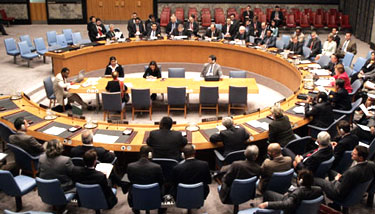- Iran will not accept any commitment beyond NPT (Islamic Republic News, 04-04-2006)
- Nuclear hypocrisy in Iran’s treatment (FCN, 03-12-2006)

UNITED NATIONS (FinalCall.com) – Iranian ambassador to the United Nations, Dr. M. Javad Zarif, addressed a packed pressroom on Mar. 29, after the Security Council issued its presidential statement concerning Iran’s nuclear program.

The non-binding statement (SC/8679) underlined the importance of Iran re-establishing full, sustained suspension of uranium-enrichment activities. The statement, which was read by Argentina’s ambassador to the UN, Cesar Mayoral, the president of the 15-member council for the month of March, called upon Iran to take “essential steps” required by the International Atomic Energy Agency’s (IAEA) Board of Governors to “build confidence in the exclusively peaceful purpose of its nuclear program and to resolve outstanding questions.”
The Security Council gave Iran 30 days to comply, but Dr. Zarif told reporters that at this point his delegation rejected the statement, and stated emphatically the issue was only about “Iran’s rights.” He added that the administration in Tehran placed little faith in the Security Council; and because it was midnight in Iran at the time of the issuance of the statement, he had yet to receive any response from his capital.
“Pressures and threats do not work for Iran,” Dr. Zarif noted, “Iran is allergic to pressure and threats and intimidation.”
According to the Washington Post, Secretary of State Condoleezza Rice stated that, “Iran is more isolated now than ever.” The U.S. along with foreign ministers from Germany, Russia, China, France and Britain were scheduled to meet on March 30 in Berlin, Germany to discuss the next steps in confronting Iran. However, western diplomats at the UN made it clear that the presidential statement had been “watered down.”
“There are some points not in the text that frankly we would have preferred to have seen in the text,” British Ambassador Emyr Jones Parry stated after the Security Council meeting.
The U.S. ambassador, John Bolton, told the Washington Post that he was frustrated that Moscow and Beijing had blocked the use of language in the presidential statement stressing the council’s obligation to react to the threat of Iran’s nuclear program.
China’s ambassador to the UN, Wang Guangya, explained to reporters that the council’s statement underscored the importance of diplomacy, and the importance of allowing the IAEA to take the lead.
“The UN Security Council has danced its way away from the issue at least for the time being,” stated an editorialist in the Gulf News, which is published in the United Arab Emirate.
“We have made it clear at the highest levels of government Iran does not want nuclear weapons, nor does it want to pursue development, stockpiling or acquisition of these inhumane weapons,” Dr. Zarif told reporters. He stated more than once that, in 250 years, Iran has not attacked anyone. “We have stated over and over again that we have no intentions of using nuclear weapons against any member of the UN,” he argued.
A reporter asked the Iranian ambassador why he felt that Iran was being targeted, and if another nation had ulterior motives in bringing the issue before the Security Council.
“It is rather ridiculous, that the single most instigator of the concern about Iran is Israel, which is not a member of the Nuclear Non-Proliferation Treaty (NPT), is a known possessor of nuclear weapons, has a history of aggression against its neighbors and is in non-compliance with I don’t know how many Security Council resolutions; that (Israel) is the single most active instigator of this façade, this charade against Iran at the UN and in bilateral relations. And that tells you what is really the underlying problem here,” Dr. Zarif answered.
The Final Call asked Dr. Zarif if he believed that Iran’s proposed oil bourse was the real reason for the antagonism against his nation.
“I am not an expert on that issue, but I believe that the motives behind the attempts to put pressure on Iran are certainly not related to the nuclear issue,” he replied.












